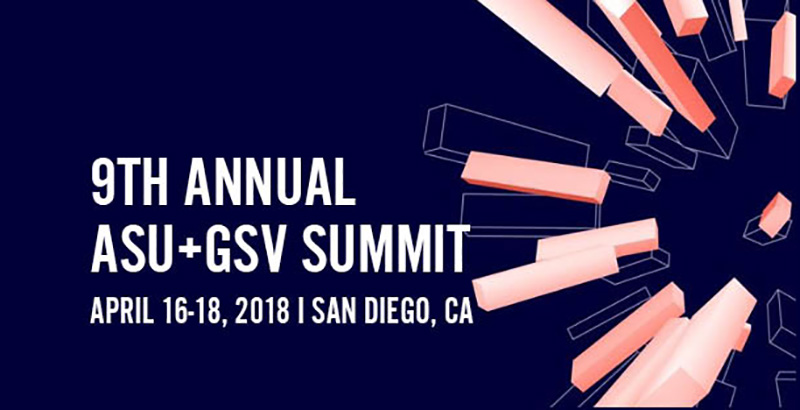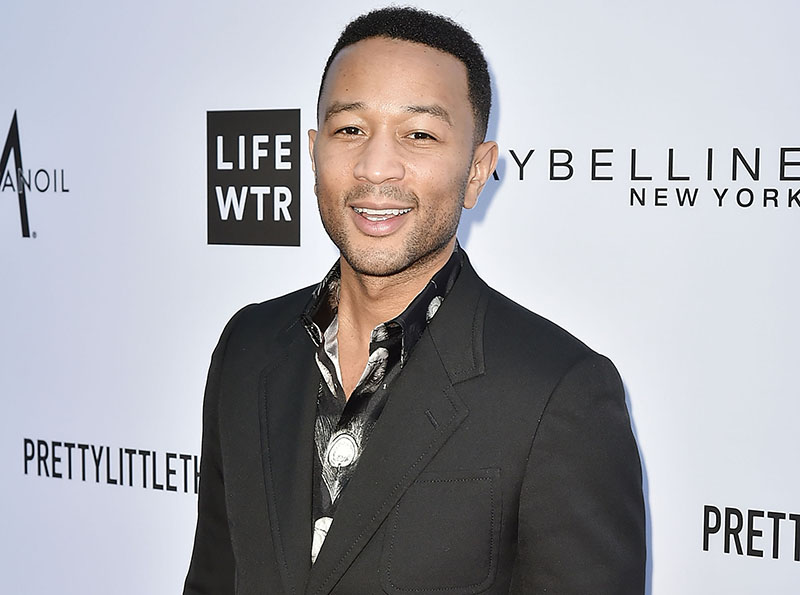Robots, Grit, Personalization: 13 Sessions You Don’t Want to Miss at This Year’s ASU+GSV Summit

Come meet The 74 in person at our social media storytelling booth — 2nd floor, Seaport Foyer. There are #74millionreasons to be an education innovator. We want to know yours. Tweet us your story for a chance to be featured on The 74.
When thousands of education and workforce experts gather in San Diego next week for the ninth annual ASU+GSV Summit, they’ll be ready to speak about some of the biggest issues facing the country over the next few decades: yawning racial and socioeconomic gaps in access to education, the rise of artificial intelligence, and the need to prepare today’s kids to be tomorrow’s workers.
That’s why a host of panels and workshops have been dedicated to the methods schools can use to develop their staff and promote more diversity in leadership. Entrepreneurs will pitch new approaches to integrating technology into classroom learning. Educators from around the world will join governors and former cabinet secretaries in discussions of cutting-edge practices to push kids toward higher education and high-paying jobs.
This year’s keynote talks will showcase the influence of public- and private-sector leaders on education and the future of work. Attendees will hear from former president George W. Bush and former U.S. education secretaries Arne Duncan and John King; social entrepreneurs, including Girls Who Code’s Reshma Saujani and OZY’s Carlos Watson; business leaders, including Pearson’s John Fallon and Fossil’s Janiece Evans-Page; and celebrity education activists John Legend and Matthew McConaughey.
To help you navigate between what might be called the “thinkfluencers” and the “innodisruptors,” The 74 has studied the ASU+GSV agenda and selected some of the most intriguing sessions. We’ve also included some pre-reading suggestions so you can ask the smartest question in the room.
Monday
TrumpED: How Is Policy Shaping Higher Ed Innovation?
Time: 3 to 4 p.m.
In a conversation moderated by Whiteboard Advisors’s Ben Wallerstein, Martha J. Kanter, executive director, College Promise Campaign; Lauren Maddox, senior policy adviser, Holland & Knight; George Miller, senior education adviser, Cengage Learning; and Tony Miller, co-founder, COO, and partner, The Vistria Group, will discuss how policies supported by President Donald Trump’s administration are impacting innovation in higher education.
Extra credit: By the Numbers: President Trump’s 10 Biggest Proposed Cuts to U.S. Education, Ranked
Can EdTech Save Rural America?
Time: 3 to 4 p.m.
Kevin Chavous, president of academics, policy, and schools, K12 Inc.; Jon Hage, CEO, Charter Schools USA; Barry Malkin, CEO, Carnegie Learning; Mark Johnson, state superintendent, North Carolina Public Schools; and Emiliano Abramzon, co-founder and head of customer success, Nearpod, will chat with the Center for Education Reform’s Jeanne Allen about how to bring 21st century innovations in teaching and learning to rural America.
Extra credit: Analysis: 5 Ways Personalized Learning Can Help Secure the Future of Rural America
The Potential of Personalization for the Whole Child: Bridging Science to Practice to Technology for All Learners
Time: 4 to 5 p.m.
If personalized learning tools could be built on research about whole child development, could technology accelerate emerging science’s impact on school design, teacher practice, and student outcomes? Dr. Pamela Cantor, president and CEO, Turnaround for Children; Dan Cogan-Drew, co-founder and chief product officer, Newsela; Gisele Shorter, vice president of policy and partnership engagement, Turnaround for Children; and Devin Vodicka, chief impact officer, AltSchool, will discuss how the science of learning can impact practice in a conversation moderated by Vic Vuchic, chief innovation officer, Digital Promise.
Extra Credit: Analysis: 5 Ways Adults Can Develop Children With Strong Social and Emotional Skills
Tuesday
True Grit: The Surprising, and Inspiring, Science of Success
Time: 8 to 10 a.m.
Angela Duckworth will deliver a talk on grit, unpacking her extensive research and her belief that grit “can be instilled and cultivated by anyone, anywhere, and at any time in life.”
All Roads Lead to Personalized Learning
Time: 12 to 1 p.m.
District and state leaders on the forefront of making learning more personalized for individual students will have a candid conversation about the challenges and opportunities they’ve faced. Sujata Bhatt, managing partner of innovation, Boston Public Schools; Kevin Connors, director of personalized learning, Chicago Public Schools; Greg Gazanian, chief strategy and innovation officer, Arcadia (California) Unified School District; and Nikolaus Namba, director of 21st century learning, Lindsay (California) Unified School District, will share their perspective with Entangled Ventures’s Michael Horn.
Extra credit: The 74’s Personalized Learning Series
Diversity and Innovation in School Systems: Perspectives From State and District Education Leaders
Time: 4 to 5 p.m.
Mike Magee, CEO, Chiefs for Change, will talk with Barbara Jenkins, superintendent, Orange County Public Schools; Wanda Legrand, deputy chancellor of social, emotional, and academic development, DC Public Schools; Pedro Martinez, superintendent, San Antonio Independent School District; and Matthew Montano, deputy secretary of teaching and learning, New Mexico Public Education Department, about what it takes to create the conditions for school and student success, and how to identify, foster, and support diverse leaders to amplify these bright spots.
Extra credit: Magee: 5 Key Points in Chiefs for Change’s Bipartisan Vision for America’s School
But Does It Work?
Time: 4 to 5 p.m.
Aubrey Francisco, chief of research, Digital Promise, will facilitate a conversation with Betheny Gross, research director, Center on Reinventing Public Education; John Pane, distinguished chair in education innovation, RAND Education; Amelia Peterson, doctoral candidate, education policy and program evaluation, Harvard Graduate School of Education; and Jake Williams, research coordinator, LEAP Innovations, about what the research says about personalized learning.
Extra credit: Betheny Gross: Starting With the ‘Why’ in Personalized Learning
Next Level Workforce
Time: 4:30 to 5 p.m.
Eric Holcomb, governor of Indiana, will discuss his state’s efforts to diversify its workforce and training opportunities to meet the growing demand in high-wage, high-skilled STEM fields.
Extra credit: Reinventing America’s Schools — Indianapolis

Keynote Panel: The Importance of Social Justice to the Future of Talent Conversation
Following keynote remarks from education activist, musician, and actor John Legend, James Shelton, president of education at the Chan Zuckerberg Initiative and former undersecretary of education, will moderate a discussion about social justice with Anurima Bhargava, CEO, Anthem of Us, and former chief of the educational opportunities section of the Civil Rights Division at the U.S. Department of Justice; John King, president and CEO, The Education Trust and former secretary of education; Topeka K. Sam, founder and executive director, The Ladies of Hope Ministries, and Janiece Evans-Page, vice president, Fossil global philanthropy and sustainability, Fossil Group Inc.
Extra credit: John King — Why Equity Matters So Much to Me
Wednesday
Education Policy Today: Pathway or Problem?
Time 10 to 11 a.m.
The 74’s Romy Drucker will have a conversation with Lewis Ferebee, superintendent, Indianapolis Public Schools; Lillian Pace, senior director of national policy, KnowledgeWorks; Hanna Skandera, former superintendent, New Mexico Department of Education; and Barbara Jenkins, superintendent, Orange County Public Schools, about whether education policy today is helping or hindering innovation that can increase equity.
Extra credit: WATCH — The Every Student Succeeds Act: 5 Things You Need to Know
Are Robots Coming to the Classroom?
Time: 11 a.m. to 12 p.m.
Sujata Bhatt, managing partner of innovation, Boston Public Schools, will chat with Angela Bao, senior investment manager, Sinovation Ventures; Zivthan Dubrovsky, co-founder and CEO, Root Robotics; Vikas Gupta, co-founder and CEO, Wonder Workshop; Alex Klein, co-founder and CEO, Root Robotics; and Krishna Vedati, CEO, Tynker, about the challenges and opportunities posed by educational robotics toys, and explore how they may play a role in increasing equity and access to the innovation economy.
Extra credit: Who Says 6-Year-Olds Can’t Program Robots? Not This Pennsylvania First-Grade Teacher
How Does Higher Ed Become an Engine of Upward Mobility Again?
Time: 2 to 3 p.m.
Seppy Basili, COO, The Jack Kent Cooke Foundation, will talk with Khristina Gonzalez, director of programs of access and inclusion, Princeton University; Nitzan Pelman, CEO at ReUp Education; Nancy Sanchez, executive director of the Kaplan Educational Foundation; Lori Sparger, COO, College of Liberal Arts at Purdue University; and Eric Waldo, executive director, Michelle Obama’s Reach Higher Initiative, and EVP for education, Civic Nation, about ensuring all students have equitable access to the future.
Taking the Lead: District Models for Identifying What Works
Time: 2 to 3 p.m.
Nancy Lue, co-lead of Advanced Education Research and Development Fund, Chan Zuckerberg Initiative, will moderate a discussion with Shana Cohen, assistant professor, Department of Education Studies at University of California, San Diego; Matt Doyle, assistant superintendent for innovation, Vista (California) Unified School District; Kristin Hallgren, senior researcher, Mathematica Policy Research; and Michael LaMont, executive director of Data and Information Group, Atlanta Public Schools, about effective research-practice partnerships, and how to show “what works.”
Extra credit: #ShowTheEvidence: Building a Movement Around Research, Impact in Ed Tech
Disclosure: Walton Family Foundation provides financial support to ASU+GSV Summit and The 74.
Get stories like these delivered straight to your inbox. Sign up for The 74 Newsletter

;)


